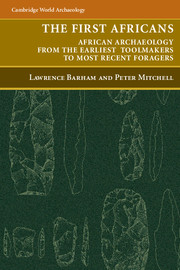Book contents
- Frontmatter
- Contents
- List of Figures and Tables
- Acknowledgements
- THE FIRST AFRICANS
- 1 Introducing the African Record
- 2 Frameworks in Space and Time
- 3 First Tool-Users and -Makers
- 4 Early Pleistocene Technologies and Societies
- 5 Mid-Pleistocene Foragers
- 6 Transitions and Origins
- 7 The Big Dry: The Archaeology of Marine Isotope Stages 4–2
- 8 Transitions: From the Pleistocene into the Holocene
- 9 Hunting, Gathering, Intensifying: The Mid-Holocene Record
- 10 Foragers in a World of Farmers
- 11 The Future of the First Africans' Past
- Notes
- Glossary
- References
- Index
10 - Foragers in a World of Farmers
Published online by Cambridge University Press: 05 June 2012
- Frontmatter
- Contents
- List of Figures and Tables
- Acknowledgements
- THE FIRST AFRICANS
- 1 Introducing the African Record
- 2 Frameworks in Space and Time
- 3 First Tool-Users and -Makers
- 4 Early Pleistocene Technologies and Societies
- 5 Mid-Pleistocene Foragers
- 6 Transitions and Origins
- 7 The Big Dry: The Archaeology of Marine Isotope Stages 4–2
- 8 Transitions: From the Pleistocene into the Holocene
- 9 Hunting, Gathering, Intensifying: The Mid-Holocene Record
- 10 Foragers in a World of Farmers
- 11 The Future of the First Africans' Past
- Notes
- Glossary
- References
- Index
Summary
The past 3000 years have seen the number of Africans pursuing a hunter-gatherer lifeway diminish to virtually zero. The contrast with the period covered thus far is stark. However, hunter-gatherers, and the descendants of people for whom hunting and gathering was still the primary means of making a living until recently, have not disappeared. They survive as recognisable communities in many African countries, while their cultural, linguistic, and genetic heritage is much more widely shared (Fig. 10.1). This chapter examines how this situation has come about, emphasising the diverse relations between hunter-gatherers and the pastoralist, agropastoralist, colonial, and postcolonial societies that first existed alongside, and now enclose, them.
Excavated archaeology, rock art, ethnography, linguistics, genetics, oral traditions, and written history track a myriad of relations: resistance, coexistence, adoption of food-production, displacement, and assimilation. After some preliminary remarks, we survey relationships between hunter-gatherers and their neighbours in four parts of the continent: East Africa; the equatorial forests; southcentral Africa; and Africa south of the Zambezi. This completed, we address the so-called Kalahari debate, asking whether these relationships have so altered the hunter-gatherer societies known to anthropologists as to render invalid their use as baselines for understanding earlier foragers. Finally, we examine the current economic and political status of African foraging peoples. This, in turn, forms a bridge to Chapter 11, which considers archaeologists' responsibilities to those claiming descent from the groups they aim to study.
- Type
- Chapter
- Information
- The First AfricansAfrican Archaeology from the Earliest Toolmakers to Most Recent Foragers, pp. 400 - 442Publisher: Cambridge University PressPrint publication year: 2008



